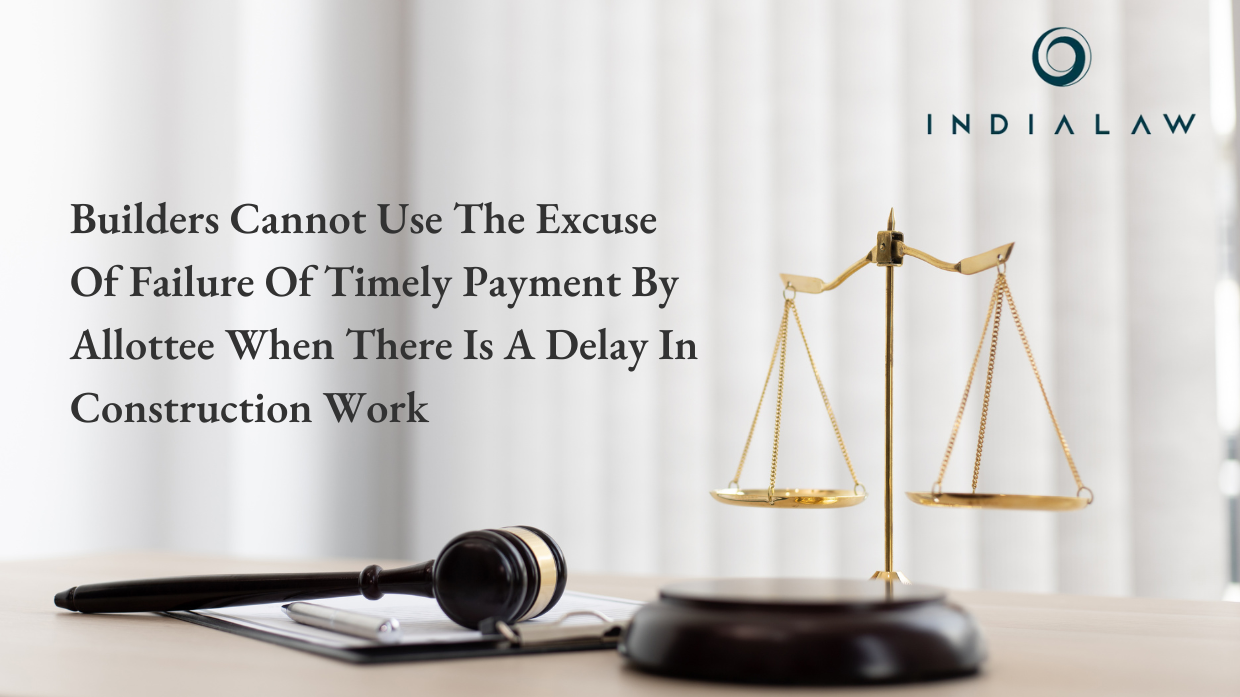Builders Cannot Use The Excuse Of Failure Of Timely Payment By Allottee When There Is A Delay In Construction Work

INTRODUCTION
The Hon’ble National Consumer Disputes Redressal Commission (“NCDRC”), New Delhi on 3rd June 2024, in the case of M/s. Puri Construction Pvt. Ltd. v. Gurudarshan Singh and Anr[i], upheld the judgement passed by the Hon’ble State Consumer Disputes Redressal Commission in Delhi (“SCDRC”) which laid down that on delay of construction work, the builder cannot argue on the failure of timely payment by the allottee and is obligated to pay interest on the original refunded amount.
Table of Contents
FACTS
The complainants/allottees had applied for allotment of a residential apartment for a consideration of Rs. 50,98,756/- plus additional charges. As per the Apartment Buyer Agreement (“said Agreement”)executed on 16th December 2008, the builder/appellant was to handover the possession of the apartment to the allottees within three years from the date of payment of the earnest money. A sum of Rs.30,12,144/- was paid by the allottees on 16th September 2011, which included the amount paid by them as surety to the builder. Interest was to be paid on behalf of the allottee on the due payment, but the builder subsequently caused a delay in completing the construction work of the building.
Not adhering to the timelines prescribed in the said Agreement, the builder was well behind the intended timeframe and only finished completing the structure by January 2013. Although the builder had delayed constructing the structure, the allottees had agreed to pay the due sum but the builder demanded more interest on the due amount. Subsequently, a consumer complaint was filed by the allottees for the above issue before the SCDRC. In this regard, the SCDRC on 20th February, 2019 ordered the builder to repay the complainant Rs.32,62,144/- along with interest @ 12% p.a. Dissatisfied by the ruling, the builder assailed the SCDRC’s decision before the NCDRC.
OBSERVATIONS OF THE NCDRC
The issue at hand for review and determination in the present case is concerning the payment of interest. The builder claims that no interest is due because the allottees were in default, whereas the allottees claim that at the time of numerous unfulfilled demands that were not even paid attention to, the construction as per the said Agreement was incomplete.
The NCRDC highlighted that the builder was due to handover possession on or before 15th December 2011, in accordance with the provisions of the said Agreement, yet it only completed the construction of the building in 2013. Furthermore, the Occupancy Certificate was applied for and approved on 22nd August 2012. The SCDRC emphasized that the said Agreement between the parties was carried out on 15th December 2008; therefore, if the 36-month period is measured from the stated date, possession ought to have been handed over by December 2011, which was evidently not adhered to. This implies that the project exceeded way beyond the time quoted in the said Agreement. Therefore, because of the non-compliance, the builder/appellant could not demand interest for the delay in payment the allottees/complainants caused.
Moreover, the NCDRC mentioned that the allotees’/complainants’ counsel acknowledged the fact that an additional sum of Rs.2,50,000/- was reimbursed to the complainants over and above the SCDRC’s directions. After adjusting the excess amount of Rs.2,50,000/- which was reimbursed to the complainants as per SCDRC’s ruling, it was directed that the appellant pay the interest payable as per the order of the SCDRC on Rs.30,12,144/- and not on Rs.32,62,144/-.
The NCDRC, thus, sustained the SCDRC’s decision with a slight alteration to the principal sum paid by the complainant, which was Rs.30,12,144/- as opposed to Rs.32,62,144/-. Consequently, the NCDRC directed the builder to pay the interest as per the original principal amount.
CONCLUSION
The decision by the NCDRC lucidly clarifies that where a builder/developer of a project is in default, it cannot be permitted to hold allottees at ransom to the timelines mentioned in the agreement between them, considering that the former itself has fallen foul of non-compliance with the stipulated terms. It is a correct and proper decision that would serve as a source of belief for other allottees in other projects which may face similar issues in relation to the upper handed approach adopted by large builders in not only delaying the handing over of possession of the property but also in charging exorbitant and enormous amounts of interest due to miniscule delays on the part of allottees.
[i] F. A. No. 746 of 2019
By entering the email address you agree to our Privacy Policy.



